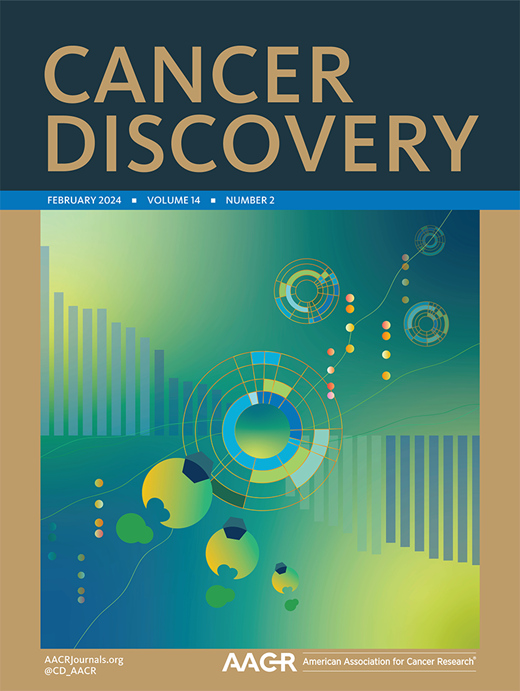Activated T cells break tumor immunosuppression by macrophage re-education
IF 29.7
1区 医学
Q1 ONCOLOGY
引用次数: 0
Abstract
Here, we observe that in human and murine melanomas, T-cell activation abates hematopoietic prostaglandin-D2 synthase (HPGDS) transcription in tumor-associated macrophages (TAMs) through TNFα signaling. Mechanistically, HPGDS installs a Prostaglandin-D2 (PGD2) autocrine loop in TAMs via DP1 and DP2 activation that sustains their pro-tumoral phenotype and promotes paracrine inhibition of CD8+ T cells via a PGD2-DP1 axis. Genetic or pharmacologic HPGDS targeting induces anti-tumoral features in TAMs and favors CD8+ T-cell recruitment, activation, and cytotoxicity, altogether sensitizing tumors to αPD1. Conversely, HPGDS overexpression in TAMs or systemic TNFα blockade sustains a pro-tumoral environment and αPD1-resistance, preventing the downregulation of HPGDS by T cells. Congruently, patients and mice resistant to αPD1 fail to suppress HPGDS in TAMs, reinforcing the evidence that circumventing HPGDS is necessary for efficient αPD1 treatment. Overall, we disclose a mechanism whereby T-cell activation controls the innate immune system, and we suggest HPGDS/PGD2 targeting to overcome immunotherapy resistance.活化的T细胞通过巨噬细胞再教育打破肿瘤免疫抑制
在这里,我们观察到在人和小鼠黑色素瘤中,t细胞激活通过TNFα信号抑制肿瘤相关巨噬细胞(tam)中造血前列腺素- d2合成酶(HPGDS)的转录。从机制上讲,HPGDS通过DP1和DP2激活在tam中安装前列腺素- d2 (PGD2)自分泌环,维持其促肿瘤表型,并通过PGD2-DP1轴促进CD8+ T细胞的旁分泌抑制。遗传或药理学的HPGDS靶向诱导tam的抗肿瘤特性,促进CD8+ t细胞的募集、激活和细胞毒性,使肿瘤对αPD1敏感。相反,在tam或全身性tnf - α阻断中,HPGDS过表达维持了促肿瘤环境和α pd1抗性,阻止了T细胞下调HPGDS。同样,αPD1耐药的患者和小鼠在tam中未能抑制HPGDS,这进一步证明了绕过HPGDS是有效治疗αPD1的必要条件。总之,我们揭示了t细胞激活控制先天免疫系统的机制,我们建议以HPGDS/PGD2为靶点克服免疫治疗耐药性。
本文章由计算机程序翻译,如有差异,请以英文原文为准。
求助全文
约1分钟内获得全文
求助全文
来源期刊

Cancer discovery
ONCOLOGY-
CiteScore
22.90
自引率
1.40%
发文量
838
审稿时长
6-12 weeks
期刊介绍:
Cancer Discovery publishes high-impact, peer-reviewed articles detailing significant advances in both research and clinical trials. Serving as a premier cancer information resource, the journal also features Review Articles, Perspectives, Commentaries, News stories, and Research Watch summaries to keep readers abreast of the latest findings in the field. Covering a wide range of topics, from laboratory research to clinical trials and epidemiologic studies, Cancer Discovery spans the entire spectrum of cancer research and medicine.
 求助内容:
求助内容: 应助结果提醒方式:
应助结果提醒方式:


